#torchbearer rpg
Explore tagged Tumblr posts
Note
Do you know of any ttrpgs that are flexible/setting agnostic, but still have the basis for a solid set of survival mechanics and equipment management? We've been wanting to adapt the game Frostpunk into a ttrpg setting, but we always run into the issue that games with survival mechanics are too setting-specific, and games which let you make your own setting would require inventing an entire mechanical subsystem from scratch. You seem to have a pretty decent breadth of knowledge about what different systems are useful for so I was wondering if you knew anything that might help us with this problem.
Sadly, resource management in the context of survival and scarcity isn't something I am very knowledgeable about when it comes to RPGs, but I have a few ideas:
Fate is very much a toolkit system and thus there are plenty of resources available to help with hacking it. Vanilla Fate already tracks stress and consequences on both mental and physical tracks, and while they are generally meant for tracking like getting punched real hard, I could see it being expanded on for more survival-focused gameplay. Also I could theoretically see having an entirely separate track tracking consequences relevant to survival entirely. The main problem with Fate is that it's very abstract in its approach to resources, so it's probably not the best option.
Torchbearer isn't a setting neutral system but it has the Grind, a system of ever-escalating consequences like Hungry, Tired, Sick and so on, that basically keep on ticking until your character dies. But as mentioned, not setting neutral.
Sadly I can't really help here, but while looking around I discovered that there's an official Frostpunk RPG coming to Backerkit soon:
15 notes
·
View notes
Photo

It's important to keep in mind the niche that the sword filled, which was to be convenient to carry around. Purely from the stand point of killing an opponent, pretty much any kind of pole weapon is going to be better than a sword. But they're also really inconvenient to carry around. Like, you're basically permanently down a hand. Anything that requires two hands to do will necessitate setting the weapon down and then subsequently picking it up again. No, you can not wear it on your back, that's not a thing.
So, the bottom line is, unless you are literally in a war, you are probably better off with a sword. And even if you are literally in a war, you should still probably have a sword. Because you aren't going to be in battle literally every second.
From an rpg standpoint, well the Torchbearer approach is to just ask "And which hand are you using to do that?" But assuming you don't feel like going full Torchbearer, probably the best approach as a GM is to just have a conversation with your players about what's a realistic weapon for their character to have, given their situation. I recall one time a player wanting to have a sword AND a spear AND a staff AND a Dane axe. I told him that he could have all of those, but realistically he could carry at most the sword and ONE of the pole weapons.

14K notes
·
View notes
Text
youtube
🔥 'I Will Be the Torchbearer' – Changli’s Powerful Cutscene Moment | Wuthering Waves Changli’s resolve is unwavering as they declare, "I will be the Torchbearer" in this powerful cutscene from Wuthering Waves! 🔥⚔️ What does this bold statement mean for Changli’s journey, and how will their path unfold in the world of Wuthering Waves? Join me as we break down this intense moment, explore the meaning behind the Torchbearer role, and uncover the layers of Changli’s character development in this epic cutscene! 🌀✨ 🔥 Don’t forget to LIKE, COMMENT, and SUBSCRIBE for more Wuthering Waves content! 🔥 #WutheringWaves #Changli #Torchbearer #WutheringWavesCutscene #Gaming #GameAnimation #WutheringWavesLore #WutheringWavesStory #ActionRPG #AnimeGame 🔔 Ready to conquer the gaming world? Subscribe for expert video game tips, unbeatable walkthroughs, strategy hacks, and endless gaming thrills. https://www.youtube.com/@TeddyNONSTOP626/?sub_confirmation=1 🔗 Stay Connected With Me. 👉 Facebook: https://ift.tt/9SaCuie 👉 Instagram: https://ift.tt/0Qq2nVo 👉 Tiktok: https://ift.tt/tXZg2fj 👉 Twitter (X): https://ift.tt/ATYfEmD 👉 Twitch: https://ift.tt/3MhBDIq 👉 Discord: https://ift.tt/IVGK8tJ 📩 For Business Inquiries: [email protected] ============================= 🎬 Recommended Playlists 👉 Genshin Impact Farming Guides https://www.youtube.com/playlist?list=PLKIq0CecS7ovHqGX4qNOmiOoY5CC5OSVA 👉 Pokemon Scarlet and Violet https://www.youtube.com/playlist?list=PLKIq0CecS7ovC_6oV1pdDmX-bRbtWvmJc 🎬 WATCH MY OTHER VIDEOS: 👉 Genshin Impact 5.2 - The Update We've All Been Waiting For https://www.youtube.com/watch?v=UfBio4VxUEU 👉 Unleash Your Potential: The Power of Self-Belief for Success and Fulfillment https://www.youtube.com/watch?v=cXrgBRu3UI0 👉 LUMINE Meets COLLEI & TIGHNARI [Sumeru Cutscene Genshin Impact] https://www.youtube.com/watch?v=xkF311szuAA 👉 Where To Catch Pawmo In [Pokemon Scarlet And Violet!] https://www.youtube.com/watch?v=3raCaxSMEA8 👉 Where To Catch Pawmi In [Pokemon Scarlet And Violet!] https://www.youtube.com/watch?v=bNhcPfH_eiM ============================= Wuthering Waves, Changli, Torchbearer, Wuthering Waves cutscene, Wuthering Waves lore, Wuthering Waves story, Wuthering Waves gameplay, Wuthering Waves animation, Wuthering Waves breakdown, Wuthering Waves reaction, Wuthering Waves theory, Wuthering Waves secrets, Wuthering Waves analysis, Wuthering Waves character development, Wuthering Waves impactful moment, Wuthering Waves hero, Wuthering Waves power statement, Wuthering Waves prophecy, Wuthering Waves cinematic, Wuthering Waves resolve, Wuthering Waves journey, Wuthering Waves symbolism, Wuthering Waves bold declaration, Wuthering Waves leadership, Kuro Games, anime RPG, open world RPG, action RPG, Wuthering Waves role, Wuthering Waves epic cutscene, Wuthering Waves deep lore © TeddyNONSTOP via TeddyNONSTOP https://www.youtube.com/channel/UCe6cRqzOyfOhWcu8op-MBxQ February 04, 2025 at 01:08PM
#videogametips#gamereviews#adventuregames#gamestrategytips#gamingcontroller#ventigenshinimpact#genshinimpact#gamingreview#Youtube
0 notes
Text
What Torchbearer Taught Me About RPGs
Google Plus is now dead. I found my preferred roleplaying-games community there. So many friends and discussions and games. I wrote the following piece on G+ in August 2017. It is the closest I’ve ever got, before or since, to RPG “theory”.
(This particular text is actually the version I posted to Facebook, which is the social-media account closest to my meat-space civilian life -- hence that little oh-what-is-an-RPG-anyway? tangent.)
+++
WHAT TORCHBEARER TAUGHT ME
Torchbearer is a roleplaying game. It taught me that I shouldn't play human characters, in roleplaying games.
~
Preamble: for the last three years, I've been playing a lot of tabletop roleplaying games (RPGs) over the Internet. Basically, you know that game the boys in Stranger Things play? That, but in a video conference.
I am a Person of Colour (tm), and I almost always play with white dudes.
I wish this didn't matter. But in 2015 I played with some dudes who, after hearing me speak, started talking about how English was definitely my second language.
Ever since I've been hyper-aware about how I present to white dudes.
~
Anyway: Torchbearer is an RPG. Based on another game called Burning Wheel, Torchbearer's schtick is nostalgia: it is designed to emulate perilous, early Dungeons & Dragons-style dungeon crawls.
It uses BW's "beliefs, instincts, and traits" (BITs) mechanic - define your character's personality and goals; get rewarded for playing accordingly.
I don't really have an issue with BITs. "Fight for what you believe in!" Oh, my self-sacrificing dwarf gets experience points for taking a hit meant for the foolhardy wizard - ie: actually being self-sacrificing? Neat!
~
But playing according to your character's beliefs and instincts is half of how you need to play in the Torchbearer ruleset.
At the end of every session, you also get experience points for "embodiment" - roleplaying in a "believable and entertaining manner throughout the entire session".
Basically, this means funny accents and exaggerated manners. Which - hey: also seems to makes sense. Funny accents and exaggeration is what makes RPGs fun. I want to have fun. You're rewarding me for having fun? Neat!
~
Thing is: embodiment can only go to everybody at the table, minus one, in any given session.
It is quite a game-designer-ly thing to think that competition is a good way to make any experience points you gain feel earned / meaningful.
So: players have to rate each other's performances. Players compete to be entertaining.
And, in my group, embodiment effectively became the "you were the least memorable character, tonight, no XP for you" penalty.
~
I found a group to play Torchbearer with, on Roll20.
My first Torchbearer character was a not-conquistador: a cleric with light in his heart, come to bring Civilisation to savage lands.
He only ever got embodiment once, when I gave him an awful accent (his name was Ulric, so it was a German accent) as a last-ditch attempt to make myself stand out.
My second Torchbearer character was a goth-chick assassin. She spoke in a slinky voice and wore the blood of her victims as makeup. Massive OTT edge-lady.
The other dudes didn't think much of her, either.
~
Okay, fine. I'll be the first to admit I'm not a great role-player. Gotta try harder!
My third Torchbearer character was Slessik, the snivelling rat-man coward. Great warriors protect Slessik, yes-yes? I did the raspy voice and the hunched posture and mimed licking my whiskers and everything.
Slessik was a hit. His embodiment rate? 100%!
I had fun playing him. And, because in Torchbearer how well-liked you are basically equals how survivable your player-character is, Slessik was my longest-lasting character.
~
After Slessik, I had enough of playing an essentially non-human character. (It made my throat sore.)
My fourth Torchbearer character was an elf. He began as a slave. He was lazy, and tried stupid schemes to get out of work; this meant he got in trouble, more often than not.
He was also a massive coward. Essentially, I saw him as Slessik, in elf form, with a stammer instead of a hunch and rasp.
~
No more embodiment. Like, 0%.
My elf died pretty quick. Dead by the - second session, I think?
I sighed, and switched to a fearless, leap-into-danger mantis-man. He / it spoke in a raspy monotone, and was a ravenous predator.
One was the other dudes said:
"Yay! Slessik is back!"
~
Was it because I didn't do a voice, with my "human" PCs?
But the other dudes didn't do voices, either. They got their experience points.
Maybe I just didn't play with enough colour. But - the other dudes played characters just as trope-y and textbook as my own. Proud barbarian; mysterious wizard; quiet Aragorn-type ranger. They were archetypes, they were fun, they got embodiment.
But I didn't. Not unless I played a monster.
~
I started thinking about the other campaigns I'd played, online, with white dudes.
I realised I had a tendency to other myself. Play outsiders. Strict cannibal savage. Cyborg with binary-to-human translator. In any party of adventurers, I was usually the outlier figure.
Easier, you know? In our video conferences, I had different skin, a different speech pattern. I couldn't understand certain references. Didn't laugh at certain jokes. I kept quiet when the other guys talked about American-football teams.
Mirroring that dynamic in-game meant less dissonance, on the whole.
~
You know - that's fine. I'm not about to pretend the cultural divide isn't there. Neither am I going to make a big fuss about it.
It's just - a thing.
~
But there's a lesson here, for designers - of games, or otherwise:
~
Thor Olavsrud, Torchbearer's creator, day-jobs in tech.
His collaborator, the designer of Burning Wheel, Luke Crane, works for Kickstarter.
Crane has previously said that he designs his games against social dysfunction. He believes that players will inevitably, inadvertently be anti-social fucks, so Burning Wheel (and, by extension, Torchbearer) are systems designed to make that impossible.
These are systems that handhold you to civility, making sure that there are incentives for working together, being group-oriented, entertaining your fellow players.
~
Olavsrud and Crane are liberal types. Crane has taken selfies with Anita Sarkeesian. Hearts in the right place, and all that.
But I think it is a distinctly technocratic stance to think that people are intrinsically going to be terrible.
And that the solution isn't to be adults and talk out our problems, but build a system where bad behaviour is impossible. "Solve" the human condition through better design.
~
That doesn't work.
Torchbearer, a game / ruleset / system Olavsrud and Crane designed, because it tries to account for and course-correct real-life-people-around-a-table social dynamics in its system design -
Is the only game I've ever played that, in effect:
(a) mechanically rewarded me for intentionally other-ing myself, and (b) mechanically punished me for not other-ing myself.
~
My takeaway from all this:
Don't try to manage real-life social dynamics using rules and systems. It doesn't work. And it will probably cause some harm.
+++
Two years on, re-reading this, I still stand by what it says, by and large. I remain skeptical of using (game) design to social-engineer a Better World. (That still belongs to real-world organising and activism. No shortcuts!)
Two things I’d do differently:
1) “Crane has previously said that he designs his games against social dysfunction.“
I no longer remember the source of this assertion, so as it stands now it’s a claim with no evidence. (I will argue that the design notes in the Burning Wheel rulebook support the idea, though.)
2) I’d further emphasise that there were no bad-intentioned people in the above account.
Torchbearer’s designers are progressives. The guys I played with were -- with one notable, Pizzagate-believing exception -- decent folk. I still remember most of the sessions I had with those guys fondly. They probably identify as woke.
240 notes
·
View notes
Text
GUESS WHO BOUGHT MORE TTRPGS!!! fucking hell I'm almost at 200...
Anyway here are the updates to my list:
1879 Aberrant Apocalypse World Blades in the Dark Cantrip Champions Now Collateral Damage Contagion Second Edition Cosmic Patrol Denial & Yearning Durance Epoch Essence 20 Fate Core System Fratboys Vs Girl by Moonlight Have Axe, Will Travel Here, There, Be Monsters! Heroes Against Darkness Interns in the Dark Killshot an Assassin's Journal Legend of the Five Rings Little Fears Nightmare Edition Mermaid Adventures Mork Borg Mutant Year Zero Night Witches Numenera OneDice Pirates & Dragons Power Rangers RPG Punk's Been Dead Since '79 Queerz! Rebels of the Outlaw Wastes Rhapsody of Blood Rivers of London Scum and Villainy Star Trek Adventures Second Edition Tangled The Play's the Thing The Void Unisystem Utopia Vagabond Valiant Univers Werewolf the Apocalypse Xianta Cyber Wuxia Xoe Micro Player
I finally have one game for every letter of the alphabet!!!
I haven't put these on the list yet, because I don't have them yet, but I am hoping to get the follow:
Dungeon World Household Stargate Torchbearer
However getting this will depend on if the both the game store having them in stock and the post office delivering my package. So we'll see!
My current list of Tabletop Roleplaying Games.
13th Age
1879
A Grim Hack
Aberrant
Absolute Power
Abyss
Accursed
After The War
Anima Beyond Fantasy
Animal Adventures: The Faraway Sea
Apocalypse World
Arkham Horror The Roleplaying Game Starter Set
Ars Magica 4th Edition
Arzium
Avatar Legends Starter Set
Babes in the Wood
Badger + Coyote and their Daring Adventures 2E
BattleTech: A Time of War
Beacon Tabletop RPG
Beam Saber
Blades in the Dark
Bulldogs
Bunkers & Badasses
Cairn
Call of Cthulhu
Candela Obscura
Cantrip
Cats of Cathulhu
Chaos 6010
Champions Now
Collateral Damage
Contagion 2e
Cortex Prime Game Handbook
Cosmic Patrol
Cowboy Bebop Roleplaying Game
Coyote and Crow
Cthulhu Awakens
Cthulhutech
Cypher System
Daisy Chainsaw
Deathmatch Island
Defiant Role Playing Game
Denial & Yearning
Dialect
Dinocar
Dinosaur Princesses
Discworld RPG
Dragon Age Roleplaying Game
Dragonbane
Dread
Dream Machines
Dresden Files Accelerated RPG
Dungeon Crawl Classics
Dungeons and Dragons 3.5
Dungeons and Dragons 5e
Durance
Dwelling
Epitaph
Epoch
Essence 20
Fabula Ultima
Fantasy Age
Fate Core System
Fever Nights Role-Playing Game
Flabbergasted
Fragged Empire
Fratboys Vs
Girl By Moonlight
Glitter Hearts
Goblin Quest
Goblin Slayer TRPG
Gods of Metal: Ragnarock
Hannukkah Goblins
Have Axe, Will Travel
Hellfrost
Here, There, Be Monsters!
Hero Kids Fantasy RPG
Heroes Against the Darkness
Hopes and Dreams
Hounds
I’m the Badguy?!?
In Nomine
In the Ashes
Inevitable A Doomed Arthurian Western
Ink
Interns In The Dark
Into the Dungeon
Jiangshi: Blood in the Banquet Hall
Jordenheim
Katana-Ra
Kids on Bikes 2nd Edition
Killshot an Assassin’s Journal
Konosuba TRPG
Leverage The Quickstart Job
Lilliputian Adventure on the Open Seas
Little Fears Nightmare Edition
Lost Roads
Marvel Multiverse RPG
Mermaid Adventures
Micro rpg book
Modern Age
Monster of the Week
Moonlight On Roseville Beach
Mork Borg
Motel Spooky Nine
Musketeers vs. Cthulhu
Mutant Year Zero
My Mother’s Kitchen
Necrobiotic
Never Going Home
Night Shift: Veterans of the Supernatural Wars
Night Wolves
Numenera
Odyssey Black Tales
OneDice Pirates & Dragons
One More Quest
Ork! The RPG
Our Woodland Gods
Outcast Silver Raiders
Outgunned
Over the Edge
Overlight
Pasion De Las Pasiones
Pathfinder 1st Edition
Pathfinder 2nd Edition
Pathfinder Savage Worlds
Perils & Princesses
Pirate Borg
Power Rangers RPG
Prism
Psychic Trash Detectives
Punk’s Been Dead Since ‘79
Queerz!
Raccoon Sky Pirates
Raven
Rebels of the Outlaw Wastes
Reign
Rhapsody of Blood
Rivers of London
Ryuu Tama natural fantasy role play
Samurai Goths of the Apocalypse
Scum and Villainy
Shadowrun 5e
Shadows Of The Past
Shield Maidens
Shiver
Someone in this Tavern is a fucking mimic!
Spell The RPG
Squeeze
Star Trek Adventures Captain’s Log
Star Trek Adventures The Roleplaying Game
Star Trek Adventures Second Edition
Star Wars
Starfinder 1st Edition
Starfinder 2nd Edition
Stoneburner
Syma
Tangled
Temples and Tombs
The Bleackness
The Dark West
The Dread of Night
The Play’s the Thing
The Quiet Year
The Revenant Society
The Void
The Watch
Thirsty Sword Lesbians
This Discord has Ghosts in It
This house is Fucking Haunted
Thousand Year Old Vampire
Tomorrow City
Troika!
Unisystem
Urban Decay
Utopia
Vaesen
Vagabond
Valiant Universe
Variations On Your Body
Venture and Dungeon
Waffles For Esther
Wanderhome
Warcraft The Roleplaying Game
Werewolf the Apocalypse
What Lurks Above
What Lurks Beneath
What Lurks Beyond
World Ending Game
Yazeba’s Bed & Breakfast
Xianta Cyber Wuxia
Xoe Microplayer
Zweihander
I'll update this list as I get more. Feel free to send me ideas and also reblog this!
#ttrpg#tabletop#tabletop rpgs#ttrpg community#dming#roleplaying games#game design#gaming#My Games List
18 notes
·
View notes
Text
Inventories in TTRPGs
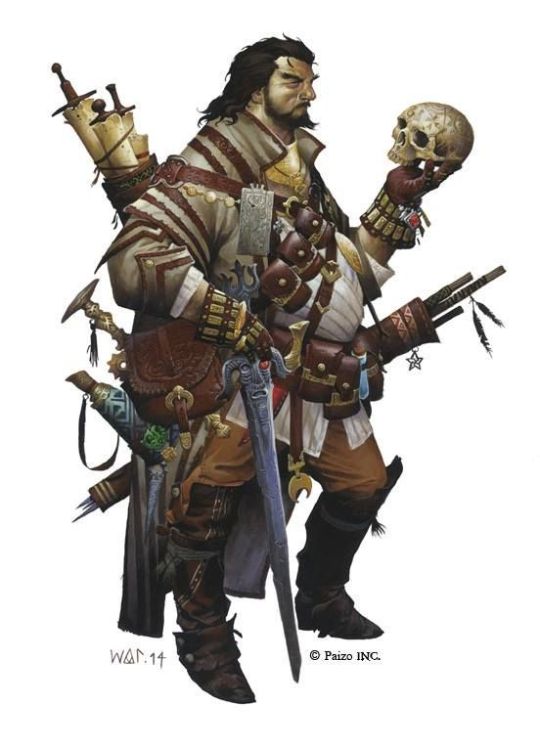
I tended to use twitter as a place to just dump my thoughts on TTRPGs and the systems within them, and I hope to do much the same here. In this spirit, I’m going to ramble about one of my favorite overlooked systems in TTRPGs, inventories, and use two games that I’m quite fond of to illustrate how they can be used to reinforce the themes of a game. Even games that I quite like often have very boring inventories. The most traditional route is of course listing all of your belongings, with weights listed next to them in pounds. Whenever you pick something up, you check against some kind of “carry limit” to see if you can take it with you. This is often tedious, and doesn’t really reflect how someone carries themselves and their possessions in the real world. In the real world, how someone protects and uses their possessions says quite a bit about how they relate to society at large. It’s pretty trite at this point to say that character sheets tell you a lot about a game and what it’s about, so let’s look at the character sheet for a game called Torchbearer.
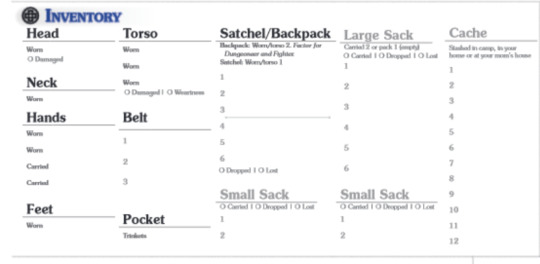
Torchbearer is a dungeoncrawling game in which the traditional murderhobo playstyle of D&D is embraced and deconstructed. The player characters live at the edges of society. They are vagrants and outcasts. Third children, who were too dull or disobedient or unlucky or ambitious to learn a craft or inherit a fortune or till the fields. They are trapped in a cycle of poverty where they dungeon-delve for the funds needed to rest in town to recover from the trials of dungeon-delving. They will adventure until they either truly strike it rich or die an ignoble, painful death. They tend not to have permanent lodgings, and must carry their belongings and property on themselves, or stash their property in safe places called Caches. Each object takes up a particular number of slots (1 or 2 usually) based on its bulk. Backpacks have more capacity than satchels, but take up 2 torso slots, forcing you to make decisions like choose between heavy armor or space. You are rewarded for creatively lashing your gear (carrying a dagger on a necklace around your neck, or keeping your spell components in bracelets or wrapped in an amulet-fetish) A large idol found in a cave might take up 4 slots, which usually means two PCs using both of their hands. Sacks can be carried empty as 1 slot, but can be filled with items and carried if you aren’t afraid to go without weapons. Here are some filled in Torchbearer inventories, as examples

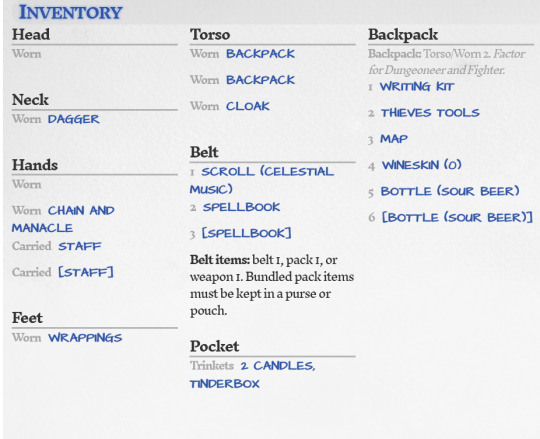
I love this system. I love being allowed to shed useful gear for gems and coin. I love the dilemma of having too much to carry but being afraid of my hard earned gear getting stolen or damaged if I leave it alone too long. I love how weighty and physical it feels, knowing exactly where on my character everything is stashed and lashed, having to drop out of a combat stance to carry a torch or a lantern. but what if you want to play a character who is not on the edges of society, who isn’t unhoused, maybe even one who owns not just property but capital? Let’s look at the Burning Wheel inventory!

In the Burning Wheel, you truly Live in a Society. Most of character creation is following your life story, the jobs you've worked, the people you've met. Your property is more than what is on your back. They're your investments, they're your debts. They're listed in the same region as your relationships because of this. They exist outside of you. Weight is often ignored, it is generally assumed you carry what you would need and have a home to keep your things in.

Money is similarly abstracted. Instead of individual coins, one keeps track of cash dice, loans, debt. You often wont even use currency when acquiring something, instead rolling your resources (a stat based on leveraging your relationships and reputations). In this abstraction, the Burning Wheel seeks to simulate the complex gift economy of the pre-capitalist world. And it's fun! You don't fiddle around with weight or conversions and yet you still are guided by rules. Instead of seeking gold, you often are left seeking patronage.


When making a tabletop rpg it is tempting to gloss over the bookkeeping and inventory management, but in many ways, your inventory is the primary way that players interact with the material world. So much of life is based around what one owns and what one wishes to own, and how you keep track of that informs the player on a lot of assumptions. Relegating it to a bunch of empty lines on the back of the sheet is, at best, a wasted opportunity.
12 notes
·
View notes
Link


Summers are short, winters long. The towns are overcrowded. Food is expensive. Guilds control trade; nobles control the taxes while priests pray for our damned souls.
Out there, beyond those walls, are beasts, bogies, monsters. They inhabit the forests, live under the fields, dwell in the ruins of our burned-out fortresses. They kidnap the lone wanderer, harry our caravans, and when they are bold, they attack our towns.
This land is wild, untamable, and in it we struggle to survive. We who thought we could conquer it, subjugate it—we are guests here, our days numbered.
New to Torchbearer? Read Thor's primer here. Download our introductory chapter here. And our work-in-progress character sheet here.

A Second Edition: One Book Becomes Two
We have been hard at work on a new edition of Torchbearer for over three years now. Based on the feedback we received from you and from our own campaigns and demos since we launched in 2013, we wanted to make a couple of tweaks to the game. Well, those "couple of tweaks" rapidly spiraled into a massive revision. Check it out:
New format and layout! The game is now a two-book set: The Dungeoneer’s Handbook and The Scholar’s Guide
Clarified, revised, refined and expanded rules from seven years of playtesting and feedback
The Dungeoneer's Handbook
275 pages, digest-sized (5.5" x 8.5")! Hardcover, linen wrap, swanky end papers, nice paper!
Revised character creation which includes tighter Nature question results
Revised leveling costs
10 levels for all classes (up from 5), including revised benefits for levels 1-5
New class: Theurge, a mad seer possessed by the immortals
New arcane spell memorization system, The Memory Palace
New divine magic system, The Immortal Burden
New invocations and spells with revised, clarified format
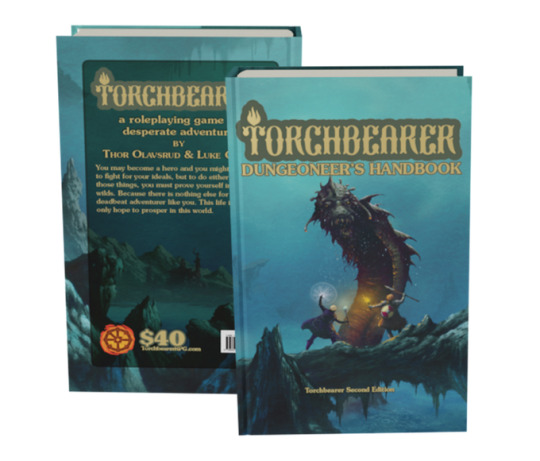
A Scholar's Guide to Dangers Various and Sundry
332 pages, digest-sized (5.5" x 8.5")! Hardcover, linen wrap, swanky end papers, nice paper!
New easy-to-process difficulty factors format throughout
Revised skill format—much easier to parse
Revised and clarified reward system
Iconic monsters all in a revised, cleaner format
New loot tables—with more treasure!
New camp and town events (they're so good!)
New demo adventure: Revised and updated Dread Crypt of Skogenby!
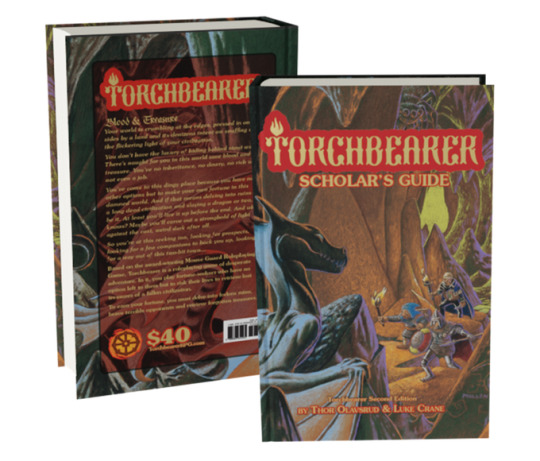
A Third Book: The Lore Master’s Manual
We came up with so many new rules and ideas around the game that they wouldn't fit in two books. So we're offering a third book full of optional material for the game. It includes:
200 pages, digest-sized (5.5" x 8.5")! Hardcover, linen wrap, swanky end papers, nice paper!
New class: the thief, go from a knife-wielding cutthroat to the shadowy power that rules this town
New class: the shaman, fueled by the Immortals of Beasts, channeling their wild power
New stock: the Troll Changeling; they're part troll, part human and all trouble
New conflicts: Banish, Abjure, Bind and Battle
New settlements like Borderland Fortress, Shire and Walled Town
Lots and lots of gear in a comprehensive list
Rules for making base camps—good for tackling those megadungeons.
Economic rules so you can crash the economy of your town
Travel rules
Simple guidance on town adventures
More spells and invocations
More monsters!
Wild new rules for spiritual quests
And more!

You’re a scoundrel, a villain, a wastrel, a vagabond, a criminal, a sword-for-hire, a cutthroat.
Respectable people belong to guilds, the church or are born into nobility. Or barring all that, they’re salt of the earth and till the land for the rest of us.
Your problem is that you’re none of that. You’re a third child or worse. You can’t get into a guild—too many apprentices already. You’re sure as hell not nobility—even if you were, your older brothers and sisters have soaked up the inheritance. If you’re cursed with visions from the Immortals, the temples won’t take you in. You question their authority and subvert their power, so you are outcast like the rest of us.
And if you ever entertained romantic notions of home-steading, think again. You’d end up little more than a slave to a wealthy noble.
So there’s naught for you but to make your own way. There’s a certain freedom to it, but it’s a hard life. Cash flows out of your hands as easily as the blood from your wounds.
But at least it’s your life.
And if you’re lucky, smart and stubborn, you might come out on top. There’s a lot of lost loot out there for the finding. And salvage law is mercifully generous. You find it, it’s yours to spend, sell or keep.
A Roleplaying Game of Desperate Adventure
Torchbearer is a roleplaying game of desperate adventure. The expeditions you undertake are taxing on your body, your mind and your very nature. To survive, you must carefully manage your food, water and light resources. To excel, you must fight for what you believe in. To prosper, you must fill your bags with loot and treasure.
This triumvirate of competing needs creates a delicious tension unique to Torchbearer. Players are asked to weigh these forces in every decision they make. Some may seem easy or frivolous to start, but the deeper you become enmeshed in an adventure, the heavier and more costly each decision becomes.
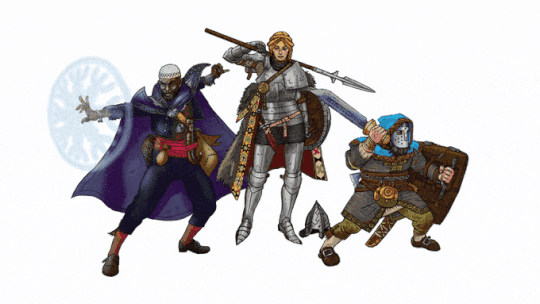
The system is based on our award-winning Mouse Guard roleplaying game system. Using the same core rules, character builds and conflict system, we have created a grimmer, harsher world. One that can stand the test of time, providing you with years of adventures.
System Preview
Eager to dive right in and create an adventurer? Download the introduction to the Dungeoneer's Handbook and our current character sheet.
Prefer to plot, plan and sketch maps? Download The Light Dims and Prepare Thyself chapters from the Scholar's Guide. We'd love to see the world you build.
Want a detailed overview of the system mechanics? Check out Luke's new currency cycle diagrams.

Books are not enough to express the full majesty of Torchbearer. We have revised and refined our action card deck as well as the equipment and light cards. The game master screen has been updated to include the revised edition information. And we're adding metal coins, custom wooden dice and a wooden card holder on top of all of that.
But these items are not merely gorgeous swag to adorn your gaming shelf, we have designed each of these items to be a useful, efficient part of the Torchbearer experience at the table:
Action cards facilitate conflicts, making them move more smoothly.
Equipment, condition and light cards offer easy reading of your current load out for you and for the rest of the table.
Use the coins as a prop for loot or use them to track light during an expedition or hit points during a conflict.
The dice are marked to clearly represent the 4+ target number of Torchbearer, but we've also included pips so you can use them to roll for armor and on tables! Dragons for scoundrels, axes for successes and the sun for a 6.
And the card holder ties it all together. You can drop your action and equipment cards into the slots on the left. While on the right you can use your copper, silver or gold coins to track your light and hit points.
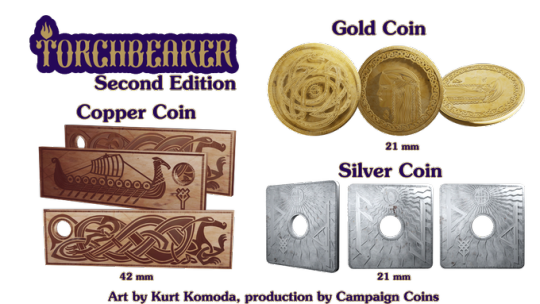
Kickstarter campaign ends: Sat, May 16 2020 6:00 PM BST
Website: [Burning Wheel] [Torchbearer RPG]
31 notes
·
View notes
Photo

Torchbearer: Middarmark ~ Burning Wheel (2017)
19 notes
·
View notes
Text

@tgirlwithreverb it's a system I'm working on for my campaign setting Aerwald, which is a fantasy world where humans are exceedingly rare. so far it's kind of an OSR-esque ruleset but with dice pools for skill checks and a big focus on downtime. there are just three classes but tons of modular rules like trades and fighting styles to make each character have a unique playstyle. the big influences are Torchbearer, The Black Hack, and Cubicle 7's Warhammer Fantasy & Soulbound RPG systems
I've succumbed to the affliction that eventually comes for every OSR enjoyer... I've started working on my own fantasy ttrpg system
28 notes
·
View notes
Text
Active GMs vs Random Encounter Tables
Torchbearer and Dungeon World (and other PbtA games) ask the GM to be an active opponent/challenger to their players. In Dungeon World this is very explicit; under the hood, everything that happens in the world is a GM move. In Torchbearer it’s somewhat less explicit, but the GM is expected to make the call as for which “wandering monster” happens when a “wandering monster” (a term Torchbearer expands greatly) is called for.
The world doesn’t stand on its own; the simulation of the world isn’t complete, without the GM actively making decisions to pull the strings, in their role as GM. This is of course true of all RPGs where NPC decisions matter since the GM has to occupy the NPC’s role when they make the decision, but this expands that. An NPC’s decision belongs to the NPC, even though the GM made it. A passageway collapsing or a patrol stumbling across the party, contrariwise, is a GM decision. Nothing in-world said that this specific failed roll leads to this negative outcome as opposed to another; the GM put it there.
This necessitates a different GMing style. In one, the style I see most associated with D&D, the world is actively reacting to the PCs and the GM is interpreting between it and the table. In the other, the GM, rather than being an interpreter for the game world, is its puppeteer.
This is a style I associate with being underprepared in D&D; I fall back on it when I don’t know enough abut the world to know how it would react “objectively”, so I pretend my reactions making something vaguely gameable are that.
#dungeon world#torchbearer RPG#dungeons and dragons#powered by the apocalypse#tenleagues essays#gm style
1 note
·
View note
Photo

New baby! Her name’s Lucienne, as the title indicates, and she’s my character for an upcoming Torchbearer campaign!
She’s a paladin and she cooks! She doesn’t have much of a concrete personality beyond that, but she’s slowly developing one, based on the way that I draw her.
Her design was heavily inspired by Celes Chere from Final Fantasy VI, especially the hair and the long, sharp facial features. I really enjoy drawing her, simply because those features are quite different from the rest of my characters, who have very soft features.
3 notes
·
View notes
Text
"Based on the award-winning Mouse Guard Roleplaying Game, Torchbearer is a riff on the early model of fantasy roleplaying games. In it, you take on the role of a fortune-seeking adventurer. To earn that fortune, you must delve into forlorn ruins, brave terrible monsters and retrieve forgotten treasures. However, make no mistake, this game is not about being a hero or about fighting for what you believe. This game is about exploration and survival. You may become a hero. You might have to fight for your ideals. But to do either of those things, you must prove yourself in the wilds. Because there are no jobs, no inheritance, no other opportunities for your deadbeat adventurers. This life is your only hope to prosper in this world."
Torchbearer may be the most Gen X tabletop RPG ever.
1 note
·
View note
Photo






In 2000, Wizards of the Coast created the Open Gaming License, which allows publishers to use portions of D&D, particularly mechanics from older iterations of the game, in their own games. This sparked a revival of interest in early D&D rules and an explosion of retro clones, hacks and reimaginings. Most of these games use concepts from the ’74 D&D/Moldvay basic/BECMI rule modified with some of the modernizations brought by D&D 3E (like progresive armor class).
Let’s start with one I fell in love with at first sight of the cover: Torchbearer. Despite being a thematic love letter to early D&D rules, this is actually a simpler, modified version of Luke Crane’s Burning Wheel system (designer Thor Olavsrud characterizes it as “advanced Mouseguard”). While the ideas behind most of the systems will be familiar to long-time roleplayers, their execution is very different.
Burning Wheel is an elegant system that seeks to create atmosphere through the application of its rules rather than through detailed campaign settings. In the case of Torchbearer, the focus is firmly on the physical hardship of exploration. Resources, including light, are scarce. Managing encumbrance and movement is critical. Even resting in camp is a process. Some RPGs are about sweeping heroic stories, others are about killing monsters, still other focus on finding treasure. Torchbearer is about surviving in a dark, hostile place, where hunger and fatigue are as much a danger as undead guardians or deadly traps. To have a character live through a session of Torchbearer is not just the point, it’s the entire challenge of the game. Its grim and fatalistic and I love it.
You’ll note, of course, that there is an entire D&D rulebook called The Dungeoneer’s Survival Guide (Torchbearer has a chapter with the same name, in fact) full of optional rules to insert into an AD&D game. This is something I find fascinating about many retro games: rather than cloning the sprawl of D&D in its entirety, they take a small slice of the rules and create a lean, mean and entirely new game out of it.
#RPG#Tabletop RPG#Roleplaying Game#roleplaying games#D&D#dungeons & dragons#advanced dungeons & dragons#AD&D#Retro#Burning Wheel#Torchbearer#Tom Moldvay#OD&D#Open Gaming License#Thor Olavsrud#Luke Crane#Dungeon Crawl#Doom
90 notes
·
View notes
Note
Hey dear author, I just got around to reading the demo update! I found it to be really wonderful. And honestly, DDWCAPH is one of the games which I always come back to reading when I feel down or exhausted, as it often brings a smile to my face. While I have played the game a few times now (before this update, which I played for the first time just about now), I have been guilty of not interacting with you about the story. I would like to change that, and apologize for not interacting, as you're very right about interactions making stories what they are.
DDWCAPH is such a unique game in so many aspects! Like it has its own soundtrack! And a very good one! Like the soundtrack totally increases immersion for me, and it totally fits the theme whenever it plays. While I am a huge fan of the IF genera as a whole and I wholeheartedly enjoy IFs meant for adults like us, I think that IFs should also be available to all age groups. And your game is one big torchbearer for IFs which are suitable to read for all age groups and still are enjoyable as adults.
Apart from the soundtrack, the writing is really good. While I didn't really look for errors specifically, I did not find any in my playthrough. It was an immersive, and lovely experience. Interacting with Ate Patricia, Daddy Robert and Mommy Julia along with our doge (I named him Pluto!) Was so precious! I am not Filipino, but I have Filipino friends and it is from them that I first got to know the meaning of word Ate, and your game taught me the meaning of Kuya. Loved the little tidbits of Filipino culture (or should I say Asian culture?) of calling our friends' parents Aunt and Uncle too, as that was really relatable as an Asian! 😄
Honestly? This game is precious. And everyone who loves IF or is trying to get into IFs should definitely read it. And I am sorry for not interacting with you sooner. I would definitely love to read the full game! The hard work and dedication you've put into the game is very clear. You have created a whole glossary, you've even given us the option of creating our own language lol, you've given us small cutesie emojis of all the characters, and a very cute stat boost or deduction notification! I never imagined that DDWCAPH would not get enough interactions. Though I imagine lots of readers were like me, reading but not providing feedback.
I promise, this will not happen again!
Hello! Thank you very much for the kind words! I'm happy to hear that DDWCaPH! has become your comfort WIP. 😊
Although I'm not really sure if there's actually any kids near the MC's age reading my story. 😅 Honestly I just find writing kids a lot more enjoyable, and considering Paddy was the original MC, you have to thank Wayne and Roselyna for that. Hehe.
I really enjoyed writing all the family interactions, so I'm glad that you enjoyed them as well! And yes, I love trying to make the story as immersive as possible. All the RPG-stuff and notifications are there because I used to (and still do sometimes) do that as well. 😄
Again, thank you! And don't worry about it. I really would've preferred to stay quiet about it, but hey, I guess it kinda worked. 😅
8 notes
·
View notes
Photo

Score Big Indie RPG Savings with the Classic Hits Bundle of Holding
In the Classic Hits Bundle you can jump aboard such RPG titles as Honor + Intrigue, Grey Ranks, Another Fine Mess, and more starting at $9.95.
#Bundle of Holding#Gaming News#Grey Ranks#Honor and Intrigue#RPGs#Save Money on Games#Tabletop Gaming#The Gaming Gang#Torchbearer
0 notes
Text
There are also plenty of better designed and more affordable TTRPGs to fit your every need. Your hobby doesn't have to stop at a stack of overpriced corporate approved content.
In light of the news that Hasbro is considering using multiple properties it owns for NFTs, including D&D, I would just like to remind everyone that PDFs of virtually all D&D source books are available online for free if you look and it's always moral to pirate from WotC
#dnd#rpg#ryuutama#savage worlds#genesys#blades in the dark#monster of the week#hillfolk#torchbearer#mork borg#soulbound#slayers#eclipse phase#red markets#d&d#dungeons and dragons#roleplaying#ttrpg#traveller#alien rpg
58K notes
·
View notes